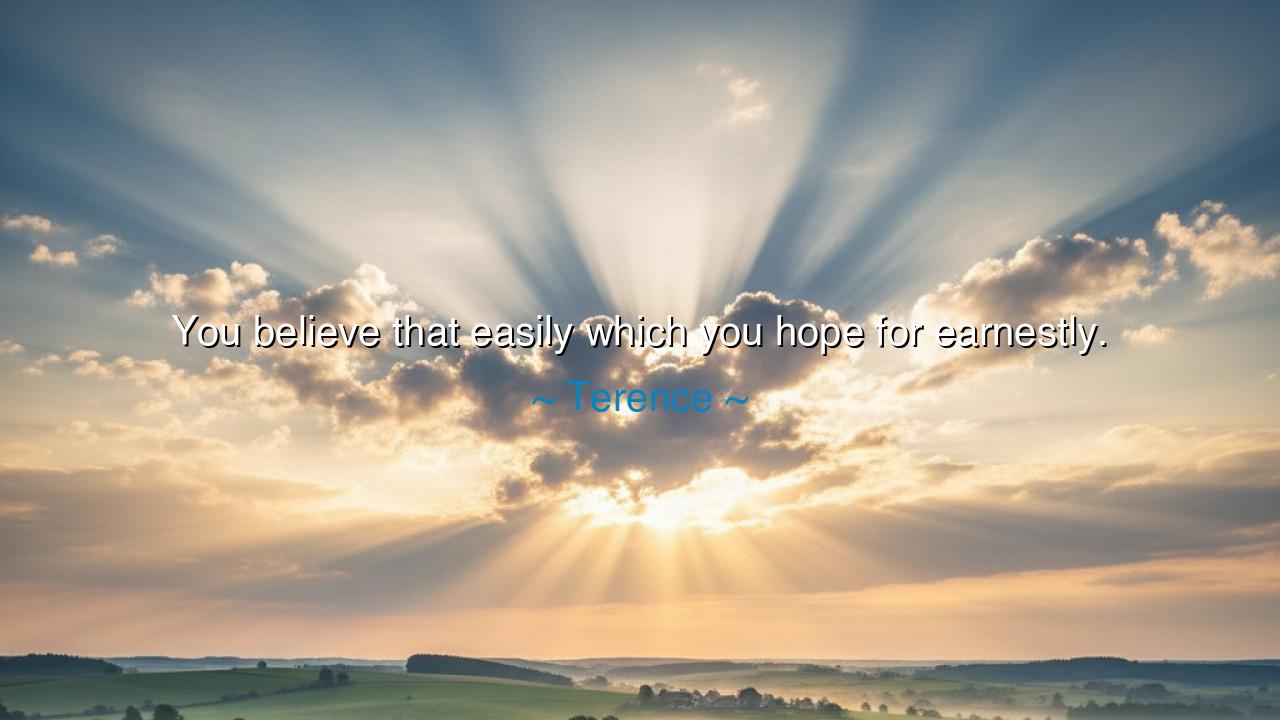
You believe that easily which you hope for earnestly.






“You believe that easily which you hope for earnestly.” — Terence
Thus spoke Terence, the Roman playwright and philosopher of the human heart, whose words still echo across the centuries with the quiet force of truth. In this simple yet profound declaration, he revealed the delicate bond between belief and hope — two lights that burn within every soul. For what a person hopes for with great longing, they are swift to believe, not because the world has proven it true, but because their heart cannot bear to think it false. In this way, Terence reminds us that belief is not born only from reason, but from desire, from that secret yearning that bends the mind toward the promise of joy.
In the ancient world, Terence observed the frailties and passions of humankind through the mirror of his plays. His insight was not the cold analysis of a philosopher, but the warm understanding of one who had seen how deeply men are ruled by their emotions. He saw lovers believe in vows too easily, soldiers trust in glory too quickly, and dreamers cling to visions that reality could not sustain. Yet he did not mock them. He understood that the power of hope — even when misplaced — was what kept humanity alive. To hope earnestly is to desire goodness, redemption, love, or triumph; to believe easily in it is the soul’s natural act of faith.
This quote also holds a mirror to the tension between illusion and aspiration. For though hope can be the seed of greatness, it can also be the root of self-deception. A man who hopes too fervently may blind himself to truth, just as one who fears too deeply blinds himself to opportunity. The wise, therefore, must learn to balance hope with discernment, and belief with understanding. Yet Terence’s tone carries not a warning, but compassion — for he knew that to hope is to live, and to live without hope is to die long before one’s final breath.
History abounds with those who illustrate his wisdom. Consider Christopher Columbus, who sailed westward into the unknown seas, guided by the belief that another world awaited beyond the horizon. It was not evidence that fueled his journey, for none had gone before him — it was hope, burning in his heart, that made his belief unshakable. Others called his vision madness; he called it destiny. Though his journey was filled with peril and imperfection, it stands as testament to Terence’s truth: that when the heart hopes earnestly enough, the mind finds reason to believe. Such faith, though fragile, is the force that moves men to discover, to create, to rise beyond fear.
Yet the same truth that uplifts can also deceive. In the tragedy of Icarus, the young man believed in his ability to soar toward the heavens, because he hoped for freedom beyond all limits. His belief, born of longing rather than wisdom, led to his fall. Thus, Terence’s insight bears dual meaning — it honors the nobility of hope, yet warns against its blindness. For hope is like fire: it can warm the soul or consume it. The discerning heart must learn to kindle it with purpose, but never let it burn beyond control.
The quote also unveils a deeper moral law — that belief follows the direction of the heart. The cynic who hopes for nothing believes in nothing. The dreamer who hopes for good believes the world can be changed. This is why leaders, prophets, and reformers throughout time have first spoken to the hopes of their people before their minds. When hope is awakened, belief follows, and when belief takes root, action becomes inevitable. Hope, belief, and action — these are the three steps upon which civilizations are built and souls redeemed.
So, my children, remember this teaching: guard your hope, for it shapes your beliefs, and your beliefs shape your destiny. Hope for what is noble, what is pure, what is enduring, and your beliefs will carry you toward greatness. But beware of hoping for what is hollow, for false hope breeds false faith. Let your hope be like a star — distant enough to guide, but not so near that it blinds. For in the balance of yearning and wisdom lies the strength of the human spirit.
And thus, Terence’s ancient wisdom still speaks: “You believe that easily which you hope for earnestly.” It is both a truth of warning and of wonder — that the heart’s desires mold the mind’s convictions. So let your hope be worthy, your belief discerning, and your faith steadfast. For those who hope wisely and believe deeply become not the victims of illusion, but the architects of destiny — men and women who turn dreams into deeds, and longing into light.






AAdministratorAdministrator
Welcome, honored guests. Please leave a comment, we will respond soon